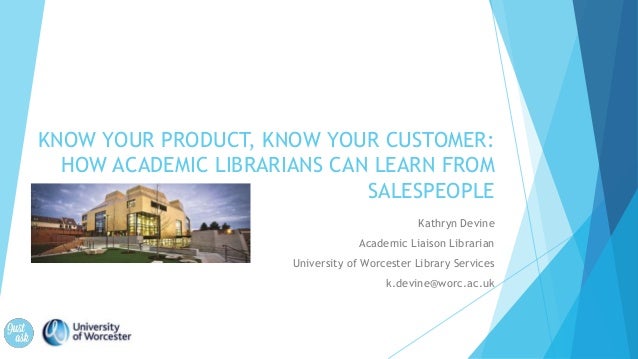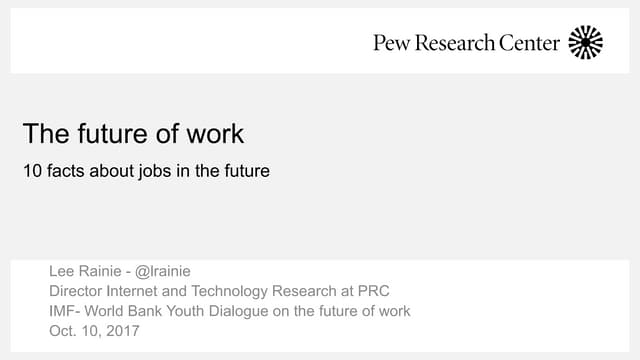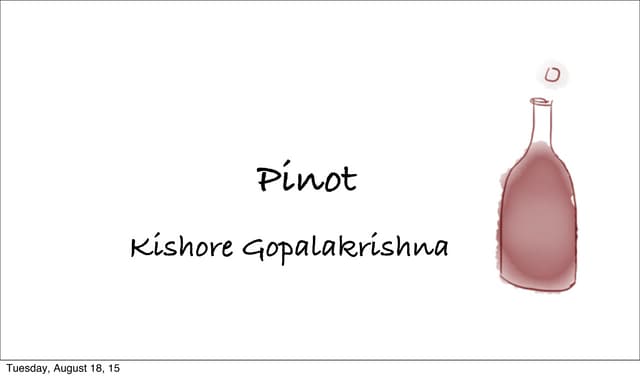-
Be the first to like this
Successfully reported this slideshow.
We use your LinkedIn profile and activity data to personalize ads and to show you more relevant ads. You can change your ad preferences anytime.
Like this presentation? Why not share!
-
The AI Rush by Jean-Baptiste Dumont 1861645 views
-
AI and Machine Learning Demystified... by Carol Smith 3908390 views
-
10 facts about jobs in the future by Pew Research Cent... 906647 views
-
Harry Surden - Artificial Intellige... by Harry Surden 779608 views
-
Inside Google's Numbers in 2017 by Rand Fishkin 1368099 views
-
Pinot: Realtime Distributed OLAP da... by Kishore Gopalakri... 629655 views
Kathryn Devine:Know your product, know your customer: how academic librarians can learn from salespeople
50 views
Published on
University of Worcester
Published in:
Education
No Downloads
Views
Total views
50
On SlideShare
0
From Embeds
0
Number of Embeds
0
Actions
Shares
0
Downloads
0
Comments
0
Likes
0
Embeds
0
No embeds
No notes for slide
Kathryn Devine:Know your product, know your customer: how academic librarians can learn from salespeople
- 1. KNOW YOUR PRODUCT, KNOW YOUR CUSTOMER: HOW ACADEMIC LIBRARIANS CAN LEARN FROM SALESPEOPLE Kathryn Devine Academic Liaison Librarian University of Worcester Library Services k.devine@worc.ac.uk
- 2. My background Education: Classics (B.A.) Nineteenth Century Studies (M.A.) Library and Information Studies (M.Sc. - current) PG Cert in Learning and Teaching in HE. BIALL Legal Foundations. Work: Financial and management accounting. Operations Manager (later Director) for a small engineering company selling quality control equipment for the metal packaging industry. Retail management in the charity sector. Disability Support Worker (UW). Hive front of house library staff/team leader. Academic liaison librarian.
- 3. King and Solis (2017) ‘Liaisons as sales force’ Vital to engage with users. Sales/engagement skills are neither innate nor routinely included in LIS training or discussed in LIS literature. Advocates Pink’s (2012) model of “non-sales selling”. Selling is about “helping people find solutions to their problems and challenges.” Rackham’s SPIN selling methodology used as a framework. Every user interaction is an opportunity to “sell”.
- 4. “Frontline librarians need to do more than just respond when the end users are looking for information. They’ve got to be out in the field spreading the word, and making the sales pitch for why the library’s resources are vitally important to the teaching and learning process.” (Bell, 2009)
- 5. Pink (2012) “Non-sales selling” “Persuading, influencing, and convincing others” (p.19). Empathetic, not pushy. “Ambiverts” – “the most skilled attuners” (p.84).
- 6. What does this all mean for us? Selling our services is vital; the marketisation of Higher Education will only make it more so. If LIS literature has gaps, adapt sales literature to help close them. We are lucky - we have a “product” and people we can believe in. We are the right people for the job; like Pink’s (2012) “ambiverts” we know when to talk and when to listen.
- 7. Getting in front of “customers” at UW Making connections with administrative and support staff. Course, department, and institute level meetings. Academic staff awaydays. Researching and disseminating that research – not just amongst our library peers. “Askalibrarian on tour” – taking the message beyond the library. Student engagement – “Study Happy”. Social media- consistent “tone”, planning. Library mascot “Reffie the Raptor”.
- 8. To paraphrase Terry Dooley (2017): Librarians can be shy about blowing their own trumpets – but at least let’s tell people we have a trumpet. Terry Dooley - University of Law, Manchester
- 9. References Bell, S. (2009) Academic librarians are not salespeople – but they should be. Available at: http://acrlog.org/2009/03/24/academic-librarians-are-not- salespeople-but-they-should-be/#comment-117448 (Accessed 12 November 2017). Clarke, K. (2017) ‘Insights discovery’. Together or apart? Effective ways of working: the 48th BIALL annual study conference. The Principal, Manchester, 8-10 June. Dooley, T. (2017) ‘Information literacy: what is means to us as librarians and how to get it across to other people.’ Together or apart? Effective ways of working: the 48th BIALL annual study conference. The Principal, Manchester, 8-10 June. King, N. and Solis, J. (2017) ‘Liaisons as sales force: using sales techniques to engage academic library users’. In the Library with the Lead Pipe. Available at: http://www.inthelibrarywiththeleadpipe.org/2017/liaisons/ (Accessed 17 January 2017). Pink, D. (2012) To sell is human. Edinburgh, Canongate. Rackham, S. (1996) The SPIN® selling fieldbook: practical tools, methods, exercises, and resources. New York, NY: McGraw Hill. University of Worcester (2017) ‘20,000? 132 chapters? 16.5 miles?’ University of Worcester Library Services blog, 28 March. Available at: https://library.worc.ac.uk/blogs/20170328 (Accessed 13 November 2017). Illustration credit: Rebecca Oxford







Be the first to comment